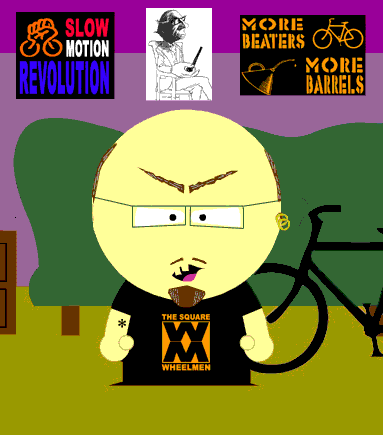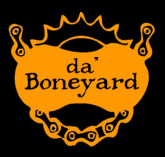31.12.06
30.12.06
Saddam Hussein Abd al-Majid al-Tikriti
his last words?

1937-2006
(Executed 30 XII 0545 Baghdad Time)
(Executed 30 XII 0545 Baghdad Time)
In my daft and bloody art
(with apologies to Dylan Thomas)
In my daft and bloody art
Exercised in the still night
With only my loony rages
And my enemies, who are dead
With all their heads in their arms,
I labor by swinging light
My population broken and bled
And my palaces full of arms
And various missile stages
Not to mention the cages
Where my sons would cut out hearts.
Not for the proud man who shrinks
From my raping goons I write
On these blood-stained pages
Nor for the towers of dead
Who were buried sans ceremony or psalm
But for the Kurds, their arms
Round their murdered generations,
Who paid no praise or wages
To Allah or my art.
AlexPGP
From The Saddam Hussein Poetry Contest
The Command Post
July 26, 2004
(with apologies to Dylan Thomas)
In my daft and bloody art
Exercised in the still night
With only my loony rages
And my enemies, who are dead
With all their heads in their arms,
I labor by swinging light
My population broken and bled
And my palaces full of arms
And various missile stages
Not to mention the cages
Where my sons would cut out hearts.
Not for the proud man who shrinks
From my raping goons I write
On these blood-stained pages
Nor for the towers of dead
Who were buried sans ceremony or psalm
But for the Kurds, their arms
Round their murdered generations,
Who paid no praise or wages
To Allah or my art.
AlexPGP
From The Saddam Hussein Poetry Contest
The Command Post
July 26, 2004
Labels: history, politix, serious shit, war stories
Saddam Hussein, Part II
An Irish journalist, Andrew Cockburn has lived in the United States for many years. He has written about the Middle East for the New York Review of Books and coproduced the 1991 PBS documentary on Iraq titled The War We Left Behind. He is also a regular contributing author for National Geographic and CounterPunch. His next book, Rumsfeld, His Rise, Fall, and Catastrophic Legacy, will be published by Simon & Schuster in February.Los Angeles Times
December 30, 2006
AMONG THE MANY ironies of Saddam Hussein's execution is that, although his death seems certain to boost sectarian bloodletting between Sunnis and Shiites in Iraq, he always posed as an Iraqi and Arab nationalist who could unite the rivalrous sects in his country — an attribute that initially recommended him to Washington.
Other qualities of the Iraqi dictator that appealed to U.S. policymakers included his sterling record in eliminating communists and his readiness to confront the Ayatollah Ruhollah Khomeini, the militant Shiite leader of Iran.
Today of all days, the administration has no desire to be reminded of the era when the U.S. actively intervened on Iraq's side in the Iran-Iraq war, supplying credit, intelligence, helicopters and, finally, active combat assistance from the U.S. Navy.
But that is indeed what happened. Something of the flavor of the relationship is summed up in a March 1984 cable from Secretary of State George Shultz to Donald Rumsfeld, who was about to visit Baghdad for the second time as President Reagan's Middle East envoy. Although the U.S. had just publicly condemned Iraq's use of chemical weapons, Shultz told Rumsfeld that the condemnation had been more or less pro forma and that "our interests in 1) preventing an Iranian victory and 2) continuing to improve bilateral relations with Iraq, at a pace of Iraq's choosing, remain undiminished…. This message bears reinforcing during your discussions."
The key to the relationship between the U.S. and Hussein over the years was that they shared the same enemies. Hussein's early political career was as a hit man for the Baath party. In 1961, he fled into exile in Egypt after botching an assassination attempt against the then-leader of Iraq, Abdul Karim Qassim. Qassim, a leftist general who ruled with the support of the Communist Party, was regarded with extreme disfavor in Washington.
In fact, Hussein's exile ended in 1963, when his Baathist colleagues seized power with covert U.S. assistance. "We rode to power on a CIA train," the party's secretary general, Ali Saleh Saadi, admitted later.
Once in power, Hussein and his party pursued a nationalist agenda that sometimes irked Washington — as when he masterminded the full nationalization of Iraq's oil assets. In the mid-1970s, the U.S. got so irritated with him that it briefly gave covert assistance to Kurdish insurgents. But the triumph of militant Shiism in Iran a few years later guaranteed Hussein a place among Washington's allies once again.
Initially, it wasn't clear that Hussein would have to go to war against Khomeini's Iran. That's because the Shiite religious leadership in Iraq posed little threat to Hussein's rule. But that began to change when the communists — who had commanded the allegiance of the Shiite masses — were crushed and liquidated. The Shiite religious hierarchy, encouraged by the success of the Islamic Revolution next door, then began asserting itself politically.
Panicked by this internal threat, Hussein decided on a preemptive attack against Iran in 1980, a move that came with covert U.S. encouragement.
Apart from the eccentric deviation of the Iran-Contra affair, Washington's support for Iraq against the militant Iranian Shiite regime remained firm during the eight-year Iran-Iraq war, despite Hussein's well-publicized use of poison gas against, as President Bush likes to remind us, his own people.
That consistent support, in fact, appears to have deluded Hussein into thinking that the U.S. would grant him concessions in return for withdrawing from Kuwait after his 1990 invasion of that country. Had he any experience of the outside world beyond his exile in Egypt and brief arms-shopping trips to Moscow and Paris — or had his advisors not been too frightened to tell him the truth — he might have understood that, with the Soviet Union's defeat in the Cold War, Third World dictators could no longer defy the U.S. and escape unpunished.
Though he was expelled from Kuwait and his economy wrecked by sanctions, Hussein was allowed to survive because Washington for a time continued to believe that he was useful as a bulwark against Iran abroad and militant Shiism at home in Iraq. When that policy was discarded by the neoconservatives after the 9/11 attacks, the dictator's days were numbered.
Hussein was for a period the prime example of the traditional U.S. means of control in the Middle East: quiet support for a repressive leader respectful of U.S. interests. That approach has now apparently been replaced by one that induces civil discord and breakdown (deliberately or otherwise), as evidenced by recent events in Iraq, Lebanon and Afghanistan.
In his final hours, Saddam Hussein may have derived some satisfaction from the unpleasant surprises this change has produced for his former friends in Washington.
Labels: history, politix, serious shit, war stories
29.12.06
The love that dares to say its name
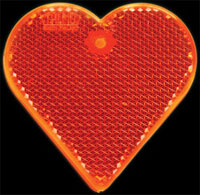 The Manchester Friends of the Earth have launched a initiative to get more folks rolling. LoveYourBike.org declares that Cycling is fun, healthy and you'll save money. It's website is packed with information and links to all things biking and provides practical advice on biking to work in Manchester.
The Manchester Friends of the Earth have launched a initiative to get more folks rolling. LoveYourBike.org declares that Cycling is fun, healthy and you'll save money. It's website is packed with information and links to all things biking and provides practical advice on biking to work in Manchester. LoveYourBike is asking folks who already bike to work to send in a description of their route. If they send in a photo of themselves and their bikes, it will be published on the website.
LoveYourBike is asking folks who already bike to work to send in a description of their route. If they send in a photo of themselves and their bikes, it will be published on the website.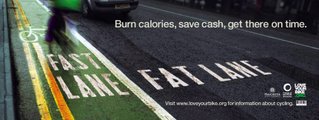 It's also asking bike commuters to report on the the good bits and the bad bits for biking in Manchester. These will be shared with other bikers and passed along to the local councils of Greater Manchester.
It's also asking bike commuters to report on the the good bits and the bad bits for biking in Manchester. These will be shared with other bikers and passed along to the local councils of Greater Manchester.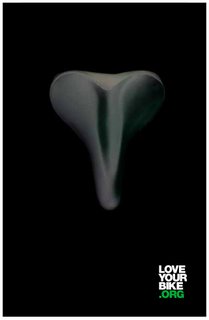 The following video is a report on the success of LoveYourBike.org. It includes a rather hilarious promotional piece that makes me wonder if we sometimes turn our love of bikes into a downright fetish.
The following video is a report on the success of LoveYourBike.org. It includes a rather hilarious promotional piece that makes me wonder if we sometimes turn our love of bikes into a downright fetish.Labels: enviromatters, new urbanism, rolling abroad
28.12.06
Gerald Ford
 Back in 1974, my father moved the family from one dying mill town in CT, Willimantic, to another, Hudson Falls, in upstate New York. Although we would make two more moves after that, I've always considered Hudson Falls my hometown. It's where I spent my painful teenage years. It's also where I first became aware of politics when Gerald Ford, that's him to the left, replaced Richard Nixon as our 38th president.
Back in 1974, my father moved the family from one dying mill town in CT, Willimantic, to another, Hudson Falls, in upstate New York. Although we would make two more moves after that, I've always considered Hudson Falls my hometown. It's where I spent my painful teenage years. It's also where I first became aware of politics when Gerald Ford, that's him to the left, replaced Richard Nixon as our 38th president. The country was literally in shambles. The economy sucked. Cars waiting for gas formed lines 2 or 3 miles long. Many cities, especially in The Rust Belt, were still smoldering from the race riots of '67 and '68. The press and Congress had revealed the tragedy of Watergate. And we had our first unelected president after Nixon became our first president to resign.
The country was literally in shambles. The economy sucked. Cars waiting for gas formed lines 2 or 3 miles long. Many cities, especially in The Rust Belt, were still smoldering from the race riots of '67 and '68. The press and Congress had revealed the tragedy of Watergate. And we had our first unelected president after Nixon became our first president to resign. Ford, never seeking the honor, literally stumbled into the Oval Office. He did much to move the country forward. Nevertheless, Ford's legacy probably won't ever match those of Reagan or Clinton. His actions, however, have reached well beyond his presidency, including our current adventure in Iraq.
Ford, never seeking the honor, literally stumbled into the Oval Office. He did much to move the country forward. Nevertheless, Ford's legacy probably won't ever match those of Reagan or Clinton. His actions, however, have reached well beyond his presidency, including our current adventure in Iraq. Ford is remembered most for pardoning Nixon. That decision, controversial to say the least, put him at odds with both the people and Congress. A moderate Republican, Ford responded by seeking allies farther to the right. Donald Rumsfeld became Secretary of Defense. Dick Cheney, a Rumsfeld protégé, became Ford's Chief of Staff. George H. W. Bush was appointed Director of Central Intelligence.
Ford is remembered most for pardoning Nixon. That decision, controversial to say the least, put him at odds with both the people and Congress. A moderate Republican, Ford responded by seeking allies farther to the right. Donald Rumsfeld became Secretary of Defense. Dick Cheney, a Rumsfeld protégé, became Ford's Chief of Staff. George H. W. Bush was appointed Director of Central Intelligence.As my father would say, 'nuff said.
27.12.06
Our Iraq adventure...
and it's tragic 9.11 milestone

Yesterday, the U.S. military reported
the deaths of six more American soldiers,
bringing the U.S. toll to at least 2,978
-- five more than the number killed
in the September 11, 2001 attacks.
the deaths of six more American soldiers,
bringing the U.S. toll to at least 2,978
-- five more than the number killed
in the September 11, 2001 attacks.
To the right at the bottom of the Back Pedal column you'll find the LED counter for the mounting costs of our Iraq adventure. It's provided free by The National Priorities Project in Northampton, MA. Here's how you can embed it in your own web page.
Labels: politix, serious shit, war stories
26.12.06
The weather is good
I feel like riding my bike

Mohammed's friends, fellow students and faculty were grieving Wednesday over the 14-year-old Bridgeview boy's death. He was killed when struck by a semitruck while riding his bicycle Tuesday afternoon [19 December 2006] at 91st Street and Harlem Avenue, police said.Stephanie Gehrig
Khawla Eassa of Palos Hills -- a cousin of Mohammed's father -- said the boy set out on his bike to buy his favorite snack.
"His mother told me that every day he wants potato chips," Eassa said.
"He puts lemon and salt on them and eats them with dinner."
One of his older sisters was going to buy coffee Tuesday afternoon and offered to give Mohammed a ride from their home in the 7100 block of Cambridge Street. He turned her down, Eassa said.
"He said, 'No, the weather is good. I feel like riding my bike,' " Eassa said.
Daily Southtown
21 December 2006
Labels: Chicago, ghostbikes
25.12.06
God save the queen!
...Elizabeth is green
 Today, the UK's queen gave top billing to bikes in her annual Christmas Message. It seems another of the Green Initiatives Elizabeth II first launched in 1985. Or perhaps she was inspired by her son Charles, Prince of Wales. Here's the relevant excerpt:
Today, the UK's queen gave top billing to bikes in her annual Christmas Message. It seems another of the Green Initiatives Elizabeth II first launched in 1985. Or perhaps she was inspired by her son Charles, Prince of Wales. Here's the relevant excerpt:The certainties of the past are vanishing: we have a nuclear North Korea, a soon to be nuclear Iran, Baghdad collapsing in an orgy of violence, radiation poisoning around the corner from my own home; arctic ice disappearing fast; the largest producer of gas holding customers to ransom; central banks moving out of the dollar.
This is my advice: don’t try to predict what will happen; we are in a period of flux and forecasts are fruitless. For example, will our blessed Kingdom be hotter or is it facing an Ice Age, as the North Atlantic oscillator switches direction? We don’t know and both scenarios are plausible.
What we can do is become more self-reliant. It’s up to us restructure our lives in a way that we can survive strongly any of the shocks that will hit our country.
The bicycle can transport you everywhere, free from dependance from petrol, rails, pilots, etc. This is probably why so many people have started riding bicycles in London.
Let me paraphrase our great writer H G Wells: "When I look out of my window and I see all the people riding their bicycles, I do not despair for the future of the human race."
Labels: enviromatters, new urbanism, rolling abroad
24.12.06
T'was the night before Xmas
the lords of misrule
 This is just a little update on the Santa Cycle Rampage 06 as everyone gets their last minute shopping out of the way. Yesterday, Orlando Patterson had a rather fascinating Op-Ed in the NYTimes. The famous Harvard sociologist writes that Xmas is
This is just a little update on the Santa Cycle Rampage 06 as everyone gets their last minute shopping out of the way. Yesterday, Orlando Patterson had a rather fascinating Op-Ed in the NYTimes. The famous Harvard sociologist writes that Xmas is...a national rite that dissolves the boundaries between sacred and secular, pagan and civilized, insiders and outsiders.
 To prove his point, Paterson observes that Santa Claus doesn't actually come to us from the venerable Old St. Nick of the Dutch. Rather, he's a descendant of the Lord of Misrule. This ancient pagan figure from the British Isles was a commoner appointed by the king and the nobility to reign over the twelve days of Christmas. He had real power. His often silly whims had to be obeyed by all, even the king.
To prove his point, Paterson observes that Santa Claus doesn't actually come to us from the venerable Old St. Nick of the Dutch. Rather, he's a descendant of the Lord of Misrule. This ancient pagan figure from the British Isles was a commoner appointed by the king and the nobility to reign over the twelve days of Christmas. He had real power. His often silly whims had to be obeyed by all, even the king. Just like our rampaging Santas, the Lord of Misrule roamed the streets with a band of rowdies. Often drunk, they sang bawdy songs and performed other silly antics. Sometimes they even barged into churches disrupting the services, an act that did not sit well with church officials. Despite this sacrilege, they were warmly welcomed by passersby with generous gifts of food and drink.
Just like our rampaging Santas, the Lord of Misrule roamed the streets with a band of rowdies. Often drunk, they sang bawdy songs and performed other silly antics. Sometimes they even barged into churches disrupting the services, an act that did not sit well with church officials. Despite this sacrilege, they were warmly welcomed by passersby with generous gifts of food and drink. Although the practice was eventually banned by the dour English Puritans, these holiday anarchists found refuge on the shores of the New World. So next year, when the Santa Cycle Rampage rolls loudly by: relax, enjoy the show. And don't forget to offer them a drink!
Although the practice was eventually banned by the dour English Puritans, these holiday anarchists found refuge on the shores of the New World. So next year, when the Santa Cycle Rampage rolls loudly by: relax, enjoy the show. And don't forget to offer them a drink!And this year?
Enjoy the silly, wacky holidays!
Enjoy the silly, wacky holidays!

Labels: bikeWINTER, Chicago, silly shit
23.12.06
Van Gogh's ear
today in history
 Many folks often suffer melancholia during the holiday season. Hopefully, they won't suffer as much as Vincent van Gogh did on this day in 1888 when he cut off his ear.
Many folks often suffer melancholia during the holiday season. Hopefully, they won't suffer as much as Vincent van Gogh did on this day in 1888 when he cut off his ear. Van Gogh had just moved to Arles, in the south of France hoping to establish an artists' colony there. It started out well. He was immediately struck by the hot reds and yellows of the Mediterranean, which he increasingly used to represent his own moods.
Van Gogh had just moved to Arles, in the south of France hoping to establish an artists' colony there. It started out well. He was immediately struck by the hot reds and yellows of the Mediterranean, which he increasingly used to represent his own moods. In October, he was joined briefly by Gauguin. They collaborated on several paintingd; but the visit was not a success. An argument led to the infamous episode when van Gogh lopped off his ear. Early the next year, he checked himself in at the St. Remy asylum.
In October, he was joined briefly by Gauguin. They collaborated on several paintingd; but the visit was not a success. An argument led to the infamous episode when van Gogh lopped off his ear. Early the next year, he checked himself in at the St. Remy asylum. Van Gogh continued to paint then moved to Auvers, to be closer to his brother Theo in 1890. He spent his last 70 days painting furiously. It was the most productive period of his life. He died, having sold only one work, following a botched suicide attempt.
Van Gogh continued to paint then moved to Auvers, to be closer to his brother Theo in 1890. He spent his last 70 days painting furiously. It was the most productive period of his life. He died, having sold only one work, following a botched suicide attempt.Labels: history, kraftwerk, silly shit
22.12.06
Stalin in Vegas
Turkmenbashi is Dead!
Long live Turkmenistan!
Long live Turkmenistan!
 In the far off lands of the Silk Road, authoritarian president Saparmurat Niyazov is dead at 66. He ruled Turkmenistan for 21 years in a fashion that was as bizarre as it was brutal. Niyazov proclaimed himself Turkmenbashi, Father of the Turkmens. He then strong-armed the parliament to pass laws banning men from wearing beards or listening to car radios. He prohibited teenagers from playing video games.
In the far off lands of the Silk Road, authoritarian president Saparmurat Niyazov is dead at 66. He ruled Turkmenistan for 21 years in a fashion that was as bizarre as it was brutal. Niyazov proclaimed himself Turkmenbashi, Father of the Turkmens. He then strong-armed the parliament to pass laws banning men from wearing beards or listening to car radios. He prohibited teenagers from playing video games. The most curious of the Central Asian republics, Turkmenistan resembles an Arab Gulf state without the money. It's the second largest Central Asian country, but four-fifths of it consist of an inhospitable lunar-like desert called the Karakum which conceals unexploited oil and gas deposits.
The most curious of the Central Asian republics, Turkmenistan resembles an Arab Gulf state without the money. It's the second largest Central Asian country, but four-fifths of it consist of an inhospitable lunar-like desert called the Karakum which conceals unexploited oil and gas deposits. With no designated successor there are fears that the autocratic state could descend into chaos, which could threaten to disrupt vital gas exports to Europe via Russia. He had done nothing to groom a successor. Those countries with vital interests in Turkmenistan, like the US and Russia, will be waiting to see how things play out over the coming days and weeks.
With no designated successor there are fears that the autocratic state could descend into chaos, which could threaten to disrupt vital gas exports to Europe via Russia. He had done nothing to groom a successor. Those countries with vital interests in Turkmenistan, like the US and Russia, will be waiting to see how things play out over the coming days and weeks. Niyazov eagerly took advantage of the U.S.-Russia rivalry. He agreed to harbor a U.S. military base after it was driven out of Uzbekistan, a favor that ensured that the U.S. administration would show tolerance for blatant abuses of human rights in Turkmenistan, regardless of President Bush's proclaimed mission of bringing freedom and democracy to the world.
Niyazov eagerly took advantage of the U.S.-Russia rivalry. He agreed to harbor a U.S. military base after it was driven out of Uzbekistan, a favor that ensured that the U.S. administration would show tolerance for blatant abuses of human rights in Turkmenistan, regardless of President Bush's proclaimed mission of bringing freedom and democracy to the world. In recent years, Niyazov had become increasingly erratic. The President for Life scattered statues of his mother around the country, placing a giant gold-plated statue of himself atop the highest building in the capital Ashgabad.
In recent years, Niyazov had become increasingly erratic. The President for Life scattered statues of his mother around the country, placing a giant gold-plated statue of himself atop the highest building in the capital Ashgabad. He then named the months of the year after himself and his mother. He also named a regional town, an airport, and even a meteorite after himself. A year ago he ordered all doctors to swear a personal oath to himself instead of the Hippocratic oath.
He then named the months of the year after himself and his mother. He also named a regional town, an airport, and even a meteorite after himself. A year ago he ordered all doctors to swear a personal oath to himself instead of the Hippocratic oath. Niyazov authored a book titled Ruhnama, or Spirituality, and ordered that all Turkmen schoolchildren, college students and government officials and civil servants study it thoroughly. As befits a divine leader, he claimed to command nature itself. One report has it that he demanded that a crop be harvested early because he'd become tired holding back the rain.
Niyazov authored a book titled Ruhnama, or Spirituality, and ordered that all Turkmen schoolchildren, college students and government officials and civil servants study it thoroughly. As befits a divine leader, he claimed to command nature itself. One report has it that he demanded that a crop be harvested early because he'd become tired holding back the rain. Niyazov and the small ruling elite that surrounded him held most of their vast wealth in offshore bank accounts and the majority of Turkmen live in abject poverty. In fact, 90 percent of income from gas exports sat in a fund that only the president could access.
Niyazov and the small ruling elite that surrounded him held most of their vast wealth in offshore bank accounts and the majority of Turkmen live in abject poverty. In fact, 90 percent of income from gas exports sat in a fund that only the president could access. While he was busy building outlandish projects, such as a huge man-made lake in the Kara Kum desert, an ice palace and a 40-meter (130-foot) pyramid, his people were suffering unemployment that ran at 50 percent in the cities and up to 70 percent in rural areas.
While he was busy building outlandish projects, such as a huge man-made lake in the Kara Kum desert, an ice palace and a 40-meter (130-foot) pyramid, his people were suffering unemployment that ran at 50 percent in the cities and up to 70 percent in rural areas. Niyazov's iron-fisted rule over his own people was often described as pharaonic, if not downright Stalinesque. His absolutism and love of building huge monuments in his own honor was derided by critics; all of them now abroad. Among his more recent victims were two journalists who worked for foreign news outlets and one human rights activist. Ogulsapar Muradova, 58, who worked for Radio Free Europe/Radio Liberty, died in prison. Her body showed obvious signs of torture.
Niyazov's iron-fisted rule over his own people was often described as pharaonic, if not downright Stalinesque. His absolutism and love of building huge monuments in his own honor was derided by critics; all of them now abroad. Among his more recent victims were two journalists who worked for foreign news outlets and one human rights activist. Ogulsapar Muradova, 58, who worked for Radio Free Europe/Radio Liberty, died in prison. Her body showed obvious signs of torture. One would hope that change will at least improve somewhat the situation of the Turkmen people. But with the balance of power in Central Asia at stake, it's unlikely that human rights abuses will be of major concern to the contestants in this tug-of-war. I expect there will be a massive fight for power now in Turkmenistan, a Russian gas industry source told Reuters.
One would hope that change will at least improve somewhat the situation of the Turkmen people. But with the balance of power in Central Asia at stake, it's unlikely that human rights abuses will be of major concern to the contestants in this tug-of-war. I expect there will be a massive fight for power now in Turkmenistan, a Russian gas industry source told Reuters.
21.12.06
Vauban not autobahn
new urbanism outside Freiburg
 USA Today ran an article Tuesday on a new neighborhood district that is a green, bike-friendly co-operative. To promote the privileges of car-free living, local authorities and urban planners have banned cars within Vauban.
USA Today ran an article Tuesday on a new neighborhood district that is a green, bike-friendly co-operative. To promote the privileges of car-free living, local authorities and urban planners have banned cars within Vauban. Instead, there is a good public transport and a convenient car sharing system. About 40% of the households have agreed to live without a car altogether. This has also greatly reduced the number of cars parked on the periphery of the neighborhood.
Instead, there is a good public transport and a convenient car sharing system. About 40% of the households have agreed to live without a car altogether. This has also greatly reduced the number of cars parked on the periphery of the neighborhood.Here is an excerpt.
Welcome to Germany's best-known environmentally friendly neighborhood and a successful experiment in green urban living. The Vauban development — 2,000 new homes on a former military base 10 minutes by bike from the heart of Freiburg — has put into practice many ideas that were once dismissed as eco-fantasy but which are now moving to the center of public policy.
With gas prices well above $6 per gallon across much of the continent, Vauban is striking a chord in Western Europe as communities encourage people to be less car-dependent. Just this week, Paris unveiled a new electric tram in a bid to reduce urban pollution and traffic congestion.
 If you want more info, I highly recommend you check out the URLs embedded in the both the text and photos of this post.
If you want more info, I highly recommend you check out the URLs embedded in the both the text and photos of this post.Labels: enviromatters, new urbanism, pensées, rolling abroad
20.12.06
Tilting at windmills
with the Ingenious Gentleman
 Man of La Mancha, the successful Broadway musical that went on to become a critically acclaimed movie, has certainly entered the consciousness of American popular culture with its impossible dream of chivalry in a brutal age.
Man of La Mancha, the successful Broadway musical that went on to become a critically acclaimed movie, has certainly entered the consciousness of American popular culture with its impossible dream of chivalry in a brutal age. But it would be unfortunate for those who have enjoyed the performances of Peter O'Toole and James Coco to pass up the pleasures of Edith Grossman's sparkling, new translation of Cervantes's The Ingenious Gentleman Don Quixote. It remains accessible to contemporary readers without loosing the richness of Cervantes's bawdy, Spanish humor.
But it would be unfortunate for those who have enjoyed the performances of Peter O'Toole and James Coco to pass up the pleasures of Edith Grossman's sparkling, new translation of Cervantes's The Ingenious Gentleman Don Quixote. It remains accessible to contemporary readers without loosing the richness of Cervantes's bawdy, Spanish humor. But be warned: this book is not for the faint-of-heart. Admirers, including Faulkner and Nabokov, have spent their entire lives reading it. Or rather, they return to their favorite parts with a loyalty that would have astounded even Sancho Panza, Quixote's bungling squire.
But be warned: this book is not for the faint-of-heart. Admirers, including Faulkner and Nabokov, have spent their entire lives reading it. Or rather, they return to their favorite parts with a loyalty that would have astounded even Sancho Panza, Quixote's bungling squire. The challenge is less its length at 940 pages than the sheer exuberance of Cervantes's storytelling. He wraps what is essentially a tragedy of the delusional Quixote in a series of comedic encounters with the absurdities of 16th century Spain. By adeptly blending prose with verse and short plays, he creates a colorful world of enchanted windmills, shaving-basin helmets and noble ladies of easy virtue.
The challenge is less its length at 940 pages than the sheer exuberance of Cervantes's storytelling. He wraps what is essentially a tragedy of the delusional Quixote in a series of comedic encounters with the absurdities of 16th century Spain. By adeptly blending prose with verse and short plays, he creates a colorful world of enchanted windmills, shaving-basin helmets and noble ladies of easy virtue. Cervantes also creates a darker world revealing a universal truth relevant to the contemporary reader: the insanity of sanity when religious fanaticism and its political allies successfully thwart the freedom to think, write and act as one pleases. But like his unswerving knight errant, Cervantes never succumbs to cynical pessimism.
Cervantes also creates a darker world revealing a universal truth relevant to the contemporary reader: the insanity of sanity when religious fanaticism and its political allies successfully thwart the freedom to think, write and act as one pleases. But like his unswerving knight errant, Cervantes never succumbs to cynical pessimism. At the beginning of Part II, Cervantes briefly describes the origins of his manuscript. Having purchased a pile of old Arabic notebooks and papers from a silk merchant in Toledo, he discovers the long-lost chronicle of Quixote written by a forgotten Muslim scholar. This fabrication recalls a golden age in Spain, well before the Inquisition and its Castilian Monarchs, when Muslims, Christians and Jews produced some of the greatest works of Spanish literature and philosophy.
At the beginning of Part II, Cervantes briefly describes the origins of his manuscript. Having purchased a pile of old Arabic notebooks and papers from a silk merchant in Toledo, he discovers the long-lost chronicle of Quixote written by a forgotten Muslim scholar. This fabrication recalls a golden age in Spain, well before the Inquisition and its Castilian Monarchs, when Muslims, Christians and Jews produced some of the greatest works of Spanish literature and philosophy. It's for these reasons that Don Quixote is commonly accepted as the first modern novel. But under Groomsman's sensitive touch, it is also an exceptionally good, entertaining and enlightening read.
It's for these reasons that Don Quixote is commonly accepted as the first modern novel. But under Groomsman's sensitive touch, it is also an exceptionally good, entertaining and enlightening read.Labels: books, history, pensées, serious shit, writing
19.12.06
On bike vestiges
and Google's new patents search
 I was flipping through the pages of Tom Cuthbertson's classic, Anybody's Bike Book, when I found his rather off-putting opinion on vestiges. If you're not familiar with the term or his criticism of it, here's what he writes:
I was flipping through the pages of Tom Cuthbertson's classic, Anybody's Bike Book, when I found his rather off-putting opinion on vestiges. If you're not familiar with the term or his criticism of it, here's what he writes:Anything on a bicycle that isn't essential is vestigial. Extra. Dead weight. Some extras can be worth their weight. The others make me feel like I have appendicitis if I write about them, so I refuse to do much more than mention them ... Filth, Filth. Filfth and junk. I refuse to say more about them.
 I find Cuthbertson's attitude both surprising and misplaced. Certainly things like bells, baskets, lights, and mirrors can clutter up a bike's feng-shui. But they are also a wonderful way to personalize what is essentially a mass-produced consumer item. Moreover, the fascinating history of their invention is virtually unknown among bike enthusiasts.
I find Cuthbertson's attitude both surprising and misplaced. Certainly things like bells, baskets, lights, and mirrors can clutter up a bike's feng-shui. But they are also a wonderful way to personalize what is essentially a mass-produced consumer item. Moreover, the fascinating history of their invention is virtually unknown among bike enthusiasts. I realized this when I discovered Google's new Patents Search. It's an incredible resource. It enables you to view every invention ever submitted to the U.S. Patent and Trademark Office. Plug in any term and you get the official documents. So here are some vestiges that I think are utterly intriguing.
I realized this when I discovered Google's new Patents Search. It's an incredible resource. It enables you to view every invention ever submitted to the U.S. Patent and Trademark Office. Plug in any term and you get the official documents. So here are some vestiges that I think are utterly intriguing.
The first bike bell

the bottle generator
Labels: history, silly shit, that which rolls





